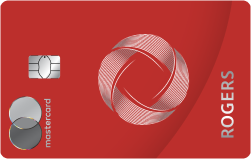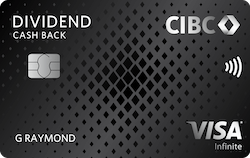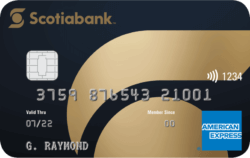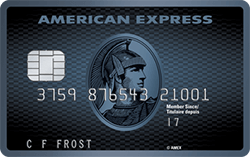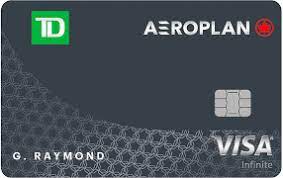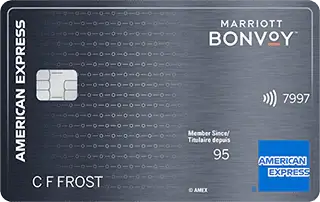Rewards credit cards are among the most popular types of credit cards in Canada. They offer either cash back or points that can be redeemed for groceries, travel, merchandise, gift cards and more. Now, let’s find the best one for your goals and spending habits.
Best rewards credit cards in Canada

Rogers Red World Elite Mastercard

Scotiabank Gold American Express Card

TD Aeroplan Visa Infinite Card
MoneySense is an award-winning magazine, helping Canadians navigate money matters since 1999. Our editorial team of trained journalists works closely with leading personal finance experts in Canada. To help you find the best financial products, we compare the offerings of major institutions, including banks, credit unions and card issuers. Learn more about our advertising and trusted partners.
Compare popular rewards credit cards
Compare your options with our interactive tool and filter credit cards based on rewards value, annual fees, income requirements and more. Use the tool below to compare credit card options, or keep scrolling for MoneySense editors’ top picks.
MoneySense award winners
We’ve selected top cards across the cash back and travel rewards categories. Let’s look at why they made the podium.
MoneySense editors apply their credit card expertise and knowledge of Canadians’ financial goals to come up with selection criteria that matches the needs of the intended cardholders. For rewards credit cards, our selection criteria focused on the rates of return for popular spending categories, the annual fees and other perks and benefits. The addition of links from affiliate partners has no bearing on the results. Read more about MoneySense’s best credit cards selection process and about how MoneySense makes money.
Best cash back credit cards
Gold: Rogers Red World Elite Mastercard
At a glance: There’s a lot of love about the Rogers Red World Elite Mastercard. With no annual fee, this cashback credit card offers 1.5% cash back on all purchases—that’s a major reward win. And in addition to a bonus for Rogers, Fido and Shaw customers, this card comes with 3% cash back on transactions in U.S. dollars, effectively eliminating the standard 2.5% foreign transaction fee (similar to what’s charged on most cards in Canada).
Rogers Red World Elite Mastercard
Annual fee: $0
- 3% cash back on all U.S. dollar purchases
- 1.5% on all other purchases (2% for Rogers, Fido and Shaw customers)
Welcome offer: None at this time.
Card details
| Interest rates | 25.99% on purchases, 27.99% on cash advances, 27.99% on balance transfers |
| Income required | $80,000 per year |
| Credit score | 725 or higher |
Pros
- Simple rewards structure: With the minimum earn rate of 1.5% cash back on all purchases, you don’t have to think about maximizing bonus categories or rewards tiers. The base earn rate is higher than any other no-fee card in Canada.
- No forex fees on U.S. purchases: Earn 3% cash back on purchases made in U.S. dollars, both in-person and online, which is enough to offset the typical 2.5% foreign transaction fee.
- Customer bonus: Rogers, Fido and Shaw customers earn an additional 0.5% on all purchases (for a total of 2%). Plus, these customers get a 1.5x redemption bonus when applying their cash back rewards to bill payments with Rogers, Fido and Shaw.
- Flexible redemptions: Cash out anytime you have $10 in rewards. Many other cash back cards disburse cash rewards through statement credits once per year.
- No annual fee: Most comparable cards charge an annual fee of $120, which offsets some of the cash back you earn each year.
- Widely accepted: You can use this card at most stores in Canada, including all the major grocers and even at Costco, which doesn’t accept Visa or Amex.
Cons
- Flat earn rate: Other cards offer higher earn rates on select categories, which could help you reap more rewards, depending on your spending habits.
- High income requirements: You’ll need a personal income of at least $80,000 or household income of at least $150,000 to qualify.
Silver: CIBC Dividend Visa Infinite
At a glance: The CIBC Dividend Visa Infinite card is a solid cash back option for Canadians, with some of the highest earn rates on gas and groceries, and flexible redemptions to boot. This rewards card offers valuable perks, such as fuel discounts through the Journie Rewards program and its comprehensive travel insurance, making it a great all-around card for everyday spending.
CIBC Dividend Visa Infinite
Annual fee: $120 (rebated first year)
- 4% cash back on eligible gas, EV charging and grocery purchases
- 2% on dining, daily transit and recurring payments
- 1% on everything else
Welcome offer: Get up to $400 in value, including a first-year annual-fee rebate. Offer not available to Quebec residents.
Card details
| Interest rates | 20.99% on purchases, 22.99% on cash advances, 22.99% on balance transfers |
| Income required | Personal income of $60,000 or household income of $100,000 |
| Credit score | 725 or higher |
Pros
- Broad spending categories: Enjoy boosted rewards on a variety of purchases; for example, the transportation spending category includes taxis, ride sharing apps and public transit.
- Easy redemptions: Redeem cash back anytime (for a minimum of $25) through CIBC online and mobile banking. Many cards disburse cash back as a statement credit once per year.
- High earn rate on common purchase categories: This is thee highest cash back earn rate for gas in Canada and is one of the highest for groceries. Plus, the gas bonus rate applies to EV charging purchases, not just at gas stations.
- Travel insurance: This reward card includes travel insurance coverage for emergency medical care, common carrier accidents and car rentals.
- Fuel discounts: Link your card with Journie Rewards and save up to 10 cents per litre at Pioneer, Fas Gas, Ultramar and Chevron stations.
Cons
- Less competitive base earn rate: 1% is pretty standard but lower than some cards. The American Express SimplyCash Preferred card, for example, has a base rate of 2%.
- High income requirement: It may be more difficult to qualify for this card than some others.
Best travel credit cards in Canada
Gold: Scotiabank Gold American Express
At a glance: The Scotiabank Gold American Express card is our pick for the best travel credit card in Canada—thanks to its competitive earn rates, comprehensive travel insurance package and other valuable perks, like no foreign transaction fees. It’s one of the best points credit cards in Canada.
Scotiabank Gold American Express
Annual fee: $120
- 6 points per $1 at Sobeys-affiliated stores
- 5 points per $1 on dining, entertainment and groceries
- 3 points per $1 on gas, transit and streaming
- 1 point per $1 on everything else
- Pay no FX fees on foreign purchases
Welcome offer: Earn up to $780 in value in the first 12 months, including up to 40,000 bonus Scene+ points. Offer ends July 1, 2025.
Card details
| Interest rates | 20.99% on purchases, 22.99% on cash advances, 22.99% on balance transfers |
| Income required | $12,000 per year |
| Credit score | 725 or higher |
| Point value | 1 Scene+ point = $0.01 when redeemed for travel, store purchases and food and drink at Cineplex and Scene partners |
Pros
- One of the best cards for points on spending: Earn up to 6 points per $1 on groceries and 5 points per $1 on dining, food delivery and entertainment spending. This is among the best reward rates for these categories in Canada. You’ll also earn 3 points per $1 on gas and transit purchases.
- Redemption window: Through the apply points to travel option, you can redeem your points retroactively for up to 12 months after you make a travel purchase.
- Comprehensive insurance benefits: The card offers robust travel insurance coverage, including $1 million in medical travel insurance, which is valid for up to 25 days – one of the longest coverage periods available.
- No foreign transaction fees: Enjoy savings on foreign currency transactions while travelling or shopping online, as this card waives the usual 2.5% foreign transaction fee.
Cons
- Fixed point redemption value: While the earn rates are high with this card, its points are always valued at $0.01 and cannot be transferred to airline frequent flyer programs, unlike some other travel cards.
- No free lounge access passes: This credit card doesn’t include free airport lounge access or visits, but instead a discount on Priority Pass memberships for airport lounge access (35% at press time).
- Limited acceptance: American Express is not as widely accepted in Canada compared to Visa and Mastercard, which may limit its use in some places. For example, Loblaw-banner grocery stores don’t accept Amex. And depending on where you travel, Amex acceptance may be even more limited.
Silver: American Express Cobalt
At a glance: This rewards credit card offers some of the highest earn rates on frequently used spending categories, which the company defines broadly. Redeeming your rewards is simple, and you can boost the value of your points by using them for travel and transferring them to other loyalty programs, like Aeroplan or Marriott Bonvoy.
American Express Cobalt
Annual fee: $156
- 5 points per $1 on dining and groceries
- 3 points per $1 on streaming services
- 2 points per $1 on transit and gas
- 1 point per $1 on all other purchases
Welcome offer: Earn 1,250 points for each month you spend $750, up to a maximum of 15,000 points.
Card details
| Interest rates | 21.99% on purchases, 21.99% on cash advances |
| Income required | None specified |
| Credit score | 725 or higher |
| Point value | 1 Amex Membership Rewards point = $0.01 when redeemed with the Flexible Points Travel Program, $0.015 on average with the Fixed Points Travel Program, and up to $0.02 with airline points transfers |
Pros
- High points earn rates: Some of the highest rewards rates of any travel card in Canada, with 5 points per dollar on groceries and dining.
- Flexible redemptions and point transfers: Redeem points for any travel expense charged to your card at a flat rate of 1 point for $0.01 in travel savings; transfer them to a participating airline and/or hotel loyalty program (including Aeroplan) at a 1:1 ratio, which can double the points’ value; or use the Fixed Points Travel chart to find a favourable rate without worrying about the carrier or blackout dates.
- Comprehensive insurance: This card comes with an impressive list of 10 types of insurance, including travel medical, car rental, hotel burglary, luggage and mobile device coverage and others.
- Exclusive access: Through the American Express Front of the Line program, you get access to presale and reserved tickets to concerts, theatre performances, movie screenings, culinary events and more.
Cons
- Limited acceptance: American Express cards are not as widely accepted as Visa or Mastercard cards, especially overseas. So, it may be worth having another card in your wallet dedicated for international travel.
- Moderately high annual fee: The $156 annual fee (charged at $12.99 per month) is higher than similar premium credit cards. Many comparable cards have an annual fee of $120.
Best airline credit card
Gold: TD Aeroplan Visa Infinite
At a glance: If you’re looking for a high-earning rate Aeroplan card with simple redemptions, take note of our pick for best airline credit card. The TD Aeroplan Visa Infinite card comes with perks like the $100 Nexus fee rebate and free checked bags.
TD Aeroplan Visa Infinite Card
Annual fee: $139 (waived first year)
- 1.5 Aeroplan points per $1 on gas, groceries and purchases
- 1.5 Aeroplan points per $1 on purchases made directly through Air Canada (including vacation packages)
- 1 point per $1 on all other purchases
Welcome offer: Earn up to $1,300 in value, including up to 40,000 Aeroplan points and no annual fee for the first year. Conditions apply.
Card details
| Interest rates | 20.99% on purchases, 22.99% on cash advances, 22.99% on balance transfers |
| Income required | Personal income of $60,000 or household income of $100,000 |
| Credit score | 680 or higher (recommended) |
| Point value | Aeroplan points are worth $0.02 on average |
Pros
- Flexible redemptions: Use Aeroplan points when booking any Air Canada seats without restrictions or blackout periods. Plus, unlike most airline loyalty programs, you can redeem points for flights with numerous airlines in the Star Alliance program, including United Airlines and Lufthansa.
- Nexus fee rebate: Get a rebate on your Nexus customs travel application every 48 months ($100 value).
- Competitive insurance package: Includes emergency medical travel coverage for longer than other credit cards; 21 days, or 4 days for those 65 and older.
- Double Aeroplan points: Get double the Aeroplan points when using this card along with your Aeroplan card at participating retailers, such as Best Buy, Starbucks, LCBO and many, many more.
Cons
- Complex loyalty program: Aeroplan is a dynamic chart-based program, meaning point values fluctuate based on where and when you’re flying, so it may not be the right program for those wanting a simple way to redeem points.
- Relatively high annual fee: This card has slightly higher annual fee compared to some other cards in this category.
Best hotel credit card in Canada
Gold: Marriott Bonvoy American Express
At a glance: With the ability to redeem for everything from room upgrades to spa treatments, Marriott Bonvoy points are valuable for frequent Canadian travellers. Plus, they’re transferrable to many airline programs. Extras, like free hotel stays and Amex benefits, make this a must-pack travel credit card for your next trip.
Marriott Bonvoy American Express
Annual fee: $120
- 5 points per $1 at Marriott properties
- 2 points per $1 everywhere else
Welcome offer: earn 50,000 Marriott Bonvoy points
Card details
| Interest rates | 21.99% on purchases, 21.99% on cash advances |
| Income required | None specified |
| Credit score | 725 or higher |
| Points value | 1 Marriott Bonvoy point is worth $0.0117 on average |
Pros
- Redemption options: Put points toward upgrades at a variety of hotels (St. Regis, The Ritz-Carlton, Westin and others) for merchandise and travel experiences. They can also be used for travel expenses like car rentals and flights.
- Annual free night’s stay: Receive free accommodation in a Marriott Bonvoy hotel every year.
- Silver Elite status: Receive complimentary Marriott Bonvoy Silver Elite status, which can get you exclusive discounted rates and higher points earn rates when you book.
- American Express perks: Get early access to event tickets through the Amex Front of the Line program, and take advantage of curated dining, retail and wellness experiences.
Cons
- Dynamic loyalty program: You’ll need to strategize, plan and pay attention to the dates and times of your bookings, if you want to get the most value out of your points.
- American Express acceptance: As an Amex card, this travel card is less widely accepted than a Mastercard and Visa credit card, both in Canada and abroad.
- Travel insurance limitations: This card does not come with travel emergency medical insurance.
Frequently asked questions
In Canada, travel credit cards work based on one of two program types: either consistent rewards (no change in value) or chart-based rewards (changing values). Some Canadian credit card providers, like MBNA and BMO, offer consistent rewards, meaning each point has specified dollar value that does not change. With chart-based programs, like Aeroplan, the value of your earned points depends on factors you’re redeeming for, like the travel date and the destination.
It depends on the credit card and rewards program. Most travel and cash back programs have no expiration date on rewards, as long as your account remains in good standing. To avoid losing points or cash back rewards, regularly use your card for purchases and/or redeem points periodically. Always check the terms and conditions of your specific rewards program to understand expiration policies, as they can vary by card.
Getting a rewards credit card when you have a bad credit history can be challenging, as most rewards cards require a good to excellent credit score for approval. However, some options exist for Canadians with lower credit scores. For example, secured credit cards often offer basic rewards programs and can help rebuild your credit. Alternatively, no-fee or entry-level rewards cards may have less stringent requirements compared to the premium credit cards. Before applying, check the eligibility criteria and consider working on improving your credit score by paying bills on time and paying off debt. This will increase your chances of qualifying for a more rewarding credit card in the future.
Top points credit cards: How much a rewards points is worth
With consistent rewards programs, the points are worth a fixed amount and this doesn’t change. Here are the values of points with consistent rewards programs in Canada.
| Credit card provider | Point value |
|---|---|
| MBNA Rewards | 1 MBNA Rewards point is worth $0.01 in eligible travel purchases, while brand-name merchandise, gift cards, cash back and charitable donations are worth $0.005 in redemption value. Some purchases must be made through the MBNA website. |
| Scene+ Points | 1 Scene+ point is worth $0.01 in redemption value for travel, purchases at affiliated grocery, liquor and drug stores, and food and drink at Cineplex and Scene partners. Points are worth slightly less when redeeming for movie tickets, gift cards, statement credits and some merchandise. |
| American Express Membership Rewards points | With the American Express Flexible Points Program, 1 point is worth $0.01 in travel rewards. You can also transfer your Amex points to other travel rewards programs like Aeroplan at a 1:1 points value ratio, where your points could be worth even more using dynamic redemption programs. Membership rewards points are worth $0.04 to $0.07 in gift cards and merchandise through MembershipRewards.com, and $0.07 when used toward a statement credit. |
| TD Rewards | 1 TD Rewards point is worth $0.005 in travel rewards booked via Expedia For TD, or $0.004 when booked through other travel providers and websites. TD Points are worth slightly less on merchandise, statement credits, purchases on Amazon.ca and gift cards. |
| BMO Rewards | 1 point is worth $0.007 in travel rewards, while the redemption value is slightly lower for merchandise and gift cards. The travel redemption value is slightly lower for BMO Rewards, but with BMO, you’re not limited to booking through its website or with certain airlines. Some cards, like the BMO Air Miles World Elite Mastercard, allow you to earn Air Miles instead of points, which can be redeemed for flights, merchandise, and more, through the Air Miles portal. |
| PC Optimum | 1 point is worth $0.001 at Loblaw-banner grocery stores, Shoppers Drug Mart and Esso and Mobil gas stations. You can stack your earned Optimum points to earn at higher rates with a PC Financial credit card like the PC Financial Mastercard. |
Are rewards credit cards worth it in Canada?
Rewards credit cards can be a great choice for Canadians looking to earn points or cash back on everyday purchases. For frequent travellers, a card with travel rewards can significantly reduce out-of-pocket travel costs, while a cash back card can provide a simpler way to get a percentage of spending back as cash. However, many rewards cards come with annual fees and interest rates that need to be factored in to your rewards card decision.
A card that offers excellent travel rewards might be less appealing to a homebody. Rewards cards may also have complex terms and restrictions, such as redemption limitations and category caps on rewards. For those who pay their balance in full each month and strategically use their card for frequent purchases, rewards cards are often worthwhile. But for those who tend to carry a balance, the cost of interest can quickly outweigh any rewards earned.
In the end, rewards cards offer strong benefits for disciplined card holders who align the card’s rewards with their lifestyle.
Pros and cons of rewards credit cards
Before applying for a credit card with high rewards, consider the following pros and cons of using rewards programs:
Pros
- Earn rewards on everyday purchases: Earn cash back or loyalty points that can be redeemed for travel, merchandise and gift cards. Many cards offer accelerated earning on specific categories, such as groceries, dining or travel, allowing you to strategically maximize your earnings.
- Valuable sign-up bonuses: Many rewards cards offer lucrative bonuses and earn rates for meeting initial spending thresholds. These rewards can be worth hundreds of dollars.
- Additional perks: Premium rewards cards often include perks, like travel insurance, airport lounge access, concierge services and exclusive deals.
Cons
- Annual fees: Many rewards cards charge modest to significant annual fees, reducing the overall value for low spenders.
- Higher interest rates: Rewards cards often have higher annual percentage rates (APRs), making them less valuable for those who carry a balance.
- Complex redemption rules: When redeeming for travel purchase, you might encounter blackout dates, restrictions or fluctuating point values, making it harder to redeem your points at full value.
- Temptation to overspend: The idea of earning rewards might encourage you to spend beyond your means.
How to choose the best rewards card
If you’re shopping around for a new rewards credit card, you may notice most boil down to two types: points or cash back. It might be tempting to pick the card that gives you the best return, but it’s not always that simple to find the best credit card for the best rewards in Canada. Where you shop, how much you spend each month and the type of rewards you prefer, these should all be part of your decision for the best rewards credit card for you.
The case for cash back rewards
If you prefer simplicity, cash-back cards are the way to go. The best cash back credit cards give you the highest return based on your everyday spending habits. They may even rank as the highest rewards credit cards in Canada. Here’s what to consider:
- Payouts: Depending on the credit card, cash back may be paid out monthly, quarterly or annually and refunded in the form of a statement credit, direct deposit to your bank account or a cheque in the mail.
- Percentage earned: Cash back credit cards offer fixed percentage on rewards based how much you spend on the card. Generally speaking, cash back cards with an annual fee will earn you a higher base percentage, so you need to factor that in if you’re comparing it to a no-fee credit card.
- Multipliers: Some cash back cards offer multipliers, meaning you get a higher percentage of cash back in certain spending categories, such as grocery stores, gas stations, drugstores and automated payments for recurring bills.
The case for points
Instead of earning cash, travel rewards credit cards net points that can be used to claim travel (flights, hotels), gift cards, or merchandise. Rewards cards can be quite lucrative when you know how to earn and redeem points effectively, but there are several features to consider.
- Type of rewards earned: Rewards credit cards are either linked to a specific brand (like a travel airline or hotel), or give you flexibility to travel on any carrier. If you’re loyal to a specific retailer, it makes sense to pick a co-branded card. If you prefer flexibility, then pick a card that gives you the most options.
- Signup bonus: Most rewards cards offer a huge signup bonus to entice Canadians to apply. Assuming you can meet the minimum spending requirements, that bonus could be worth a few hundred dollars.
- Ease of redemption: Rewards are useless if you don’t use them. Look for loyalty programs without blackout dates. Another no-deal? Too many restrictions. Be sure you can redeem your points whenever it’s convenient for you.
- Value of your points: Know what your rewards (specifically points or branded dollars) are actually worth. For example, if you earn 1 point for every $1 spent, and it takes 100 points for you to claim $1 in rewards, your points are worth 1%. If you have a co-branded flight or hotel credit card, determine how many points it takes to get your free seats or stays.
- Additional benefits: Aside from rewards, you’ll want to look at the additional perks. Many rewards cards offer the following standard benefits: comprehensive travel insurance package, auto rental insurance and price protection.
